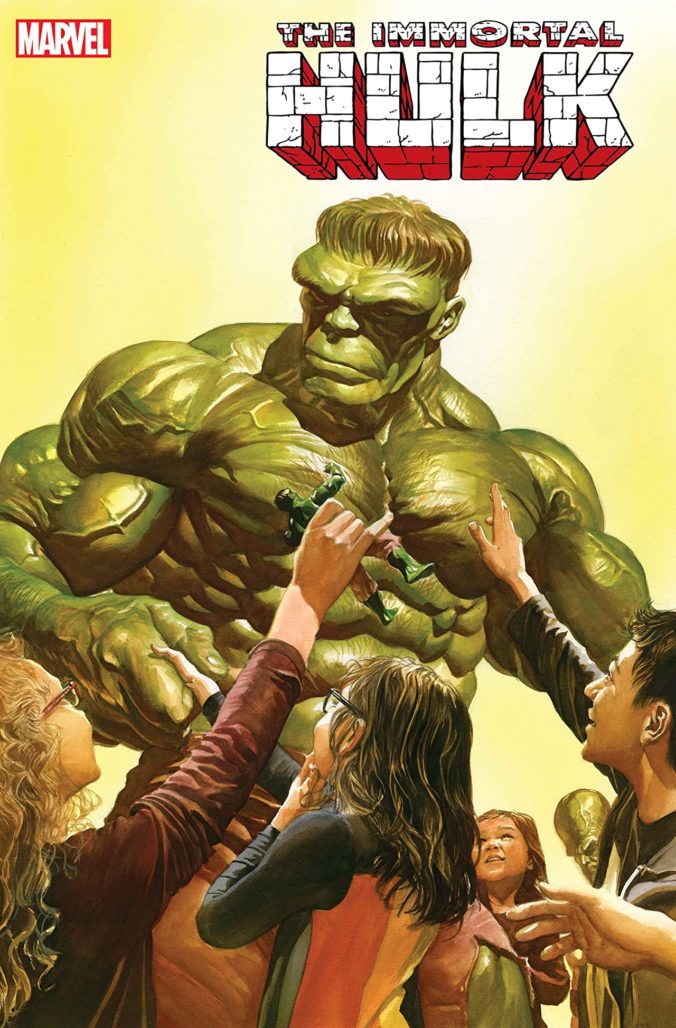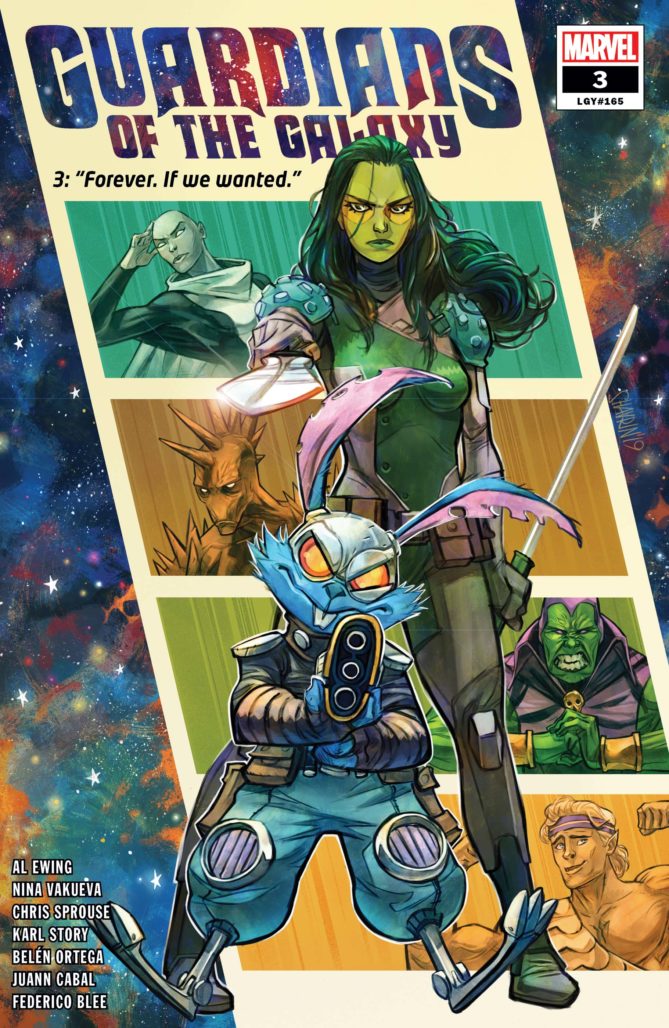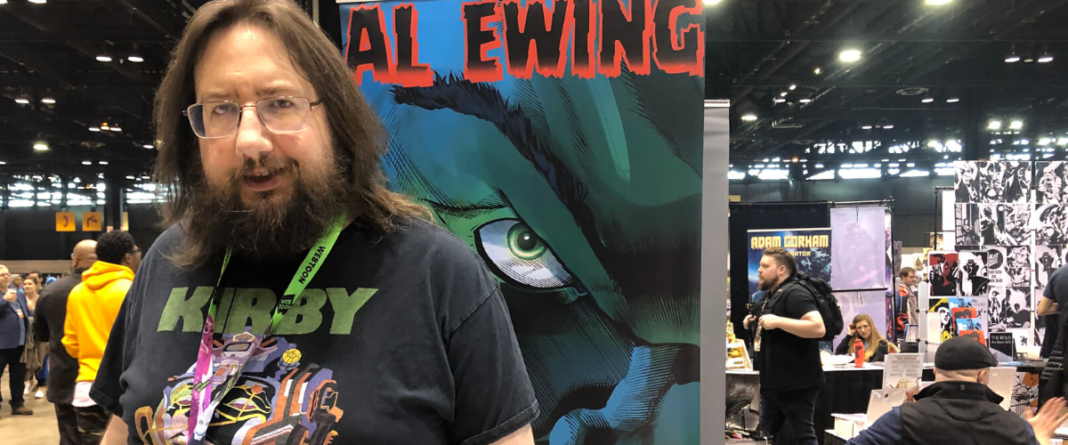Al Ewing has always been a fan favourite writer, with his work on The Ultimates, Loki: Agent of Asgard, and Captain America and the Mighty Avengers. In 2018, he made his biggest entry yet on the mainstream stage alongside artist Joe Bennett, inker Ruy Jose, colourist Paul Mounts, and letterer Cory Petit with the mega-hit Immortal Hulk series.
His body horror take on the character proved to be a huge success, and Immortal Hulk is consistently the best title that Marvel’s currently publishing, or at least this humble writer thinks so. The Beat caught up with Ewing during this year’s C2E2 and we chatted about his runs on Hulk and Guardians of the Galaxy, the themes he’s tackling in his books, and the stories that superhero comics can tell in today’s climate.
The Beat: The first twenty-five issues of Immortal Hulk featured a lot of body horror elements. With issue twenty-six, you’ve shifted your focus from that to more of a capitalist commentary with kaiju fights. Can you talk about your decision to change that focus?
Al Ewing: I don’t think it was quite as sudden as that. For one thing, I’ve been telling people this all weekend, body horror is coming back in issue thirty-three, the big 750th legacy issue. Before that, leading up to issue twenty-five, we’d brought in various political ideas. We’d brought in the environment as a theme. I think the through-line there is both in the horror of the everyday, and anger as a theme. I was really thinking about things that make people angry, and of what makes them afraid. If you’re talking about the end of the world that we’re currently living through, it’s both anger-making and horrifying.

The other thing I touched on, particularly in issue twenty-six, is the Hulk as a counter-cultural figure. If you look back at those early issues, he’s hanging around with juvenile delinquents. In the ’60s, Iron Man’s building weapons for the military industrial complex. Hulk is beating them up. From a time before Stan Lee thought, “Actually, I’m feeling very counter-cultural myself,” Hulk was still the earliest example. I feel like Immortal Hulk is a book where we can do that and it won’t be out of place. It’s been an interesting journey, though I think some readers didn’t appreciate it as much as others. I don’t think it was unnecessary or that it veered off-track.
The Beat: It just feels very prescient. I feel like I see a lot of what’s going on today reflected in this current arc. I see, I’m gonna say it, a very Trumpian villain in the Minotaur.
Ewing: The Minotaur is Trump before he became Trump, but you could say Trump, or Jeff Bezos, or Mike Bloomberg. If somebody went up to me and said, “The Minotaur reminds me of Bloomberg,” I would say, “Oh. Ok.”
The Beat: I say Trump because of the way the Minotaur dispatches his subordinates, like we’ve seen on the news recently.
Ewing: I will say, as a British person, we don’t have the same respect for the office as the Americans have. They have a strong respect for the office of the president. The current situation, which I think is similar to Nixon, is a different dynamic. I don’t like to comment on American politics in my personal social media feeds because British politics are so appalling. How would I spare the time? Nobody wants to see me talk about Trump when Boris Johnson is the British Prime Minister.
So the Minotaur, for me, isn’t going after anyone in specific, but it is definitely taking a political stance. I try to avoid pretending to be an expert in another country’s politics, but I think there are certain political stances that can and should be taken. If I choose to make the work apolitical, that is itself a political decision. Likewise, if I don’t throw all of myself into the work then that short-changes the reader. Not every book would do this, though. You’re not going to get stuff like this in Guardians of the Galaxy, for example. Hulk is special. And part of what makes Hulk special is you can do this.
The Beat: It’s in the DNA of the character.
Ewing: Yes, exactly.
The Beat: You’re allowed to stretch those limits.
Ewing: Hulk is, I think, the most limitless character Marvel has. Part of that lack of limits is that you can speak to things that superhero comics generally shy away from. I say that, but I’m not doing anything Steve Gerber didn’t do. Or Steve Englehart. I’m following the traditions of Marvel in the ’70s. Maybe this is just part of comics. To be honest, I haven’t had that much back-chat on it. Editorial have been wonderful in letting me do things my way. Joe [Bennett] has been wonderful as an artistic collaborator, and I’ve been working with him to make sure the stuff he wants to do is in the book. And the readers seem, generally, willing to come onboard. There are times when I thought I’ve gone too far on certain things. But I’ve been very happy with it.

The Beat: With the great success you’ve had I’m not surprised people are sticking with the book. You’ve blown them away, the book is a breakout.
Ewing: I’m very grateful for those who have stuck with it, and maybe that includes people who are picking up the book and reading things they don’t agree with. I’m grateful to those readers as well. I can’t give them half a job. I need to put all of myself into it, and sometimes that means going to these places.
The Beat: You’ve explored Hulk as this anti-authoritarian hero of the people since he’s taken action against Roxxon.
Ewing: I think he’s always been heavily anti-authoritarian. He’s always had a strong following in the counter-culture, in those early issues like I said with the Teen Brigade.
The Beat: I meant more in how it’s reflected in the journalist character Jackie, and how she’s jealous that Bruce gets to express his rage in a way that she can’t. And now that sentiment is kind of applied to the world as he’s captured the world’s anger and is directing it at Roxxon. Is he the hero we deserve or the hero we need?
Ewing: We’re going to get to a point that questions what is effective. It’s not saying that anger isn’t effective, it’s about how Bruce may fall down in other ways. It’s tough because the Hulk is not Batman. He’s not a hero with a plan. I think in that sense, at this point in time, someone with a plan is needed? But also that rage, that anger, is valid. As an avatar of rage, the Hulk should not be feared and we shouldn’t be locking that anger away. He’s also a representative of people with dissociative identity disorder. There’s a lot of things that the Hulk is, but the question is whether it’s enough for Roxxon. That gets to a larger question of, in the real world, how do we deal with late-stage capitalism? How do we deal with the horrors in our lives? I’m not sure I have the answer, but maybe I can at least provide a moment of catharsis.
The Beat: I wanted to talk about Guardians of the Galaxy. In the upcoming third issue, like with Immortal Hulk, you tell the story from multiple perspectives with multiple artists. What’s the thought process that goes into this? Is it a coincidence, is it a method of storytelling you like, are you trying to give your main artist a break, or is there something else?
Ewing: It’s a thing I’ve done three times now. The first time was an Immortal Hulk, the second time was on Valkyrie because it worked so well on Immortal Hulk, and then it worked well enough on Valkyrie that I thought I’d do it again for Guardians. Each time it’s been slightly different, but it’s to give the artist a little break in the middle of a trade. Before I started doing this there was a narrative in certain parts of the comic press where swapping an artist out was almost a failure. With schedules and the abilities of artists being what they are… no artist is superhuman. The sands of time fall through the hourglass. If you want the best work, it’s not always the quickest work. It was bad to put this expectation on the artist that they should do five issues and that the last issue of the trade would be as mindblowing as the first five. Not everyone is capable of that.

So I came up with this thing I do in the first arc where the third issue would be a guest artist spotlight, and I’d bring a few fun artists in to do that. I’ll probably do it again because it’s a nice thing to do and makes for great issues. That’s mixed with a thing I’m doing in Guardians where it seems to have fallen into a pattern of two issues of non-stop action with an issue to breathe, and then action all the way for two issues with another issue to breathe. Then we start breaking the pattern. I get to have this emotional issue, this issue that falls on the heels of the events of issue two with the seeming death of Peter Quill. I get to explore everyone’s emotional reaction to that and I get to do it with three wonderful artists. We’ll see what people will think of it. We’ll see if they like it as much as the other times I’ve done it.
The Beat: I feel that with the success of Immortal Hulk, people were expecting who would be the next solo character that you would take on. Why the Guardians?
Ewing: I’ve done teams before, and basically Marvel editorial asked me if I had any ideas for Guardians. Suddenly I had a whole bunch of them. Generally it was an idea of how to do Guardians. I really wanted to go back to the Dan Abnett and Andy Lanning days. Not those days exactly but the feel of those days where there was a coherent space political landscape. This kind of happened around the same time as a few other initiatives that bubbled up at Marvel that involved the cosmic side of Marvel, so it was a good time to get involved.
To be honest, I guess what I’m hoping to do with Guardians is to swing away from the Guardians as a super-team and more as a gateway to a massive, almost Game of Thrones-style space landscape of different factions. I’m trying to get to that place. I feel like the big test of my ideas on this will be what we do in response to Empyre. We’re not tying into Empyre. I’m kind of writing a team again, but I’m also writing a landscape. And we’ll see how much I manage to do of one or the other. I hope it becomes a book for not just people who like the particular team that we’ve built, but people who like all the cosmic characters.
The Beat: You’ve employed this reflective and summative look at the Guardians. You’re taking advantage of their history; these characters are tired and beaten down. Was that the hook that you found in the group, to examine the characters and what they’ve been through over the course of the last couple of years?
Ewing: Part of it is that I do enjoy telling stories about characters who are at the end of their rope in one way or another. There are a lot of people who like their superheroes to be indefatigable and ultra-powerful. I always find superheroes at their most interesting and most heroic when they’re at their weakest. The idea of starting with the Guardians as just burnt out, it made it interesting for me and, like I mentioned earlier, I wanted to get into something without getting into current politics. But maybe I could touch on the feel of current politics.
The Beat: You get to make up your own politics in a cosmic landscape.
Ewing: There is that, but I wanted to give the sense of not knowing where things were going, but we know they aren’t going to be good. I think in a way it becomes more of a holiday from the world than an actual reflection of it, but I wanted to do space politics. Part of that involves treating the Guardians as veterans of wars. At what point do you say, “You can go home.” If you treat them as superheroes they’re always expected to go out and keep fighting. There were a lot of people who were astonished that Gamora would say, “No, I don’t want to fight anymore. I’m not re-upping, I’m not re-enlisting. I’ve done my tours.” And she’s done about ten. That’s why I’m not treating them as superheroes but as a group of veterans. That’s something that’s definitely come out as I’ve written it, and it’s part of the appeal in that I think treating them as superheroes almost lessens them as characters. I feel like I’m continuing where Donny [Cates] left off in that respect. He started a procedure and I’ve carried on from him, but obviously doing it my way.
Published by Marvel Comics, Guardians of the Galaxy #3 is on sale now, while Immortal Hulk #33 is due out next Wednesday, March 25th.








